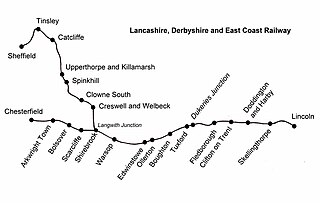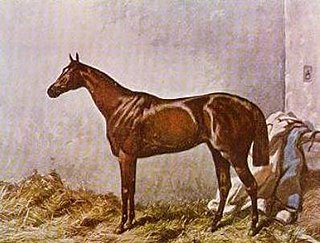George Young may refer to:
George Dixon may refer to:
Alexander Mackenzie most commonly refers to:
George King may refer to:

Tuxford is a historic market town and a civil parish in the Bassetlaw district of Nottinghamshire, England. At the 2001 census, it had a population of 2,516, increasing to 2,649 at the 2011 census.
George Grant may refer to:

West Australian (1850–1870) was a British Thoroughbred racehorse and sire. In a racing career which lasted from October 1852 until June 1854 he ran ten times and won nine races. After being beaten on his debut, he won all his remaining starts including the 2000 Guineas, The Derby the St Leger and the Ascot Gold Cup. He has been retrospectively recognised as the first Triple Crown winner. West Australian was regarded by contemporary experts as one of the best British horses of the nineteenth century. After his retirement from racing he had some success as a sire of winners in England and France and was largely responsible for the survival of the Godolphin Arabian sire-line.
George Kennedy (1925–2016) was an American actor.

Tuxford Central railway station is a former railway station in Tuxford, Nottinghamshire, England.
George Ferguson may refer to:

Hermit (1864–1890), sometimes known, incorrectly as "The Hermit", was a 19th-century British Thoroughbred racehorse and sire. In a racing career which lasted from April 1866 until July 1869 he ran 23 times and won eight races. He was a leading two-year-old in 1866 and won the 1867 Epsom Derby, despite breaking down in training shortly before the race. He continued to race until the age of five, but never recovered his form after running three times in three days at Doncaster in September 1867. After his retirement he had a long and highly successful career at stud.

Tuxford is a village in the Canadian province of Saskatchewan within the Rural Municipality of Marquis No. 191 and Census Division No. 7. Moose Jaw is 14 kilometres (8.7 mi) south and Buffalo Pound Lake is 16 kilometres (9.9 mi) north. Highway 2, Highway 42 and Highway 202 all intersect in the community. Highway 202 connects the community to Buffalo Pound Provincial Park 11 kilometres (6.8 mi) to the east.
Brigadier-General George Stuart Tuxford, was a pioneer of the Buffalo Pound Lake District, Saskatchewan, and later a senior officer in the Canadian Expeditionary Force (CEF). During the First World War he served first as officer commanding the 5th Battalion and later as general officer commanding 3rd Canadian Infantry Brigade, 1st Canadian Division.

The 3rd Canadian Infantry Brigade was a formation of the Canadian Army in both World War I and World War II. The brigade fought on the Western Front during the First World War, and in Sicily and Italy during the Second World War.
George Parker Tuxford of Barnes, London, was a British magazine publisher.
William Wedd Tuxford was a parliamentarian and agricultural machinery dealer in the early days of the Colony of South Australia.

Turquoise (1825–1846) was a British Thoroughbred racehorse and broodmare who won the classic Oaks Stakes at Epsom Downs Racecourse in 1828. In a racing career which lasted from April 1828 until April 1830 she ran eighteen times, winning eleven races and finishing second on five occasions. As a three-year-old in 1828 she failed to attract a bid after winning a claiming race at Newmarket but then created an upset by winning the Oaks at odds of 25/1. She went on to prove herself a leading stayer, winning three more races before the end of the season. In 1829 she won five more races including three walkovers when no horses appeared to challenge her. She was retired after a single unsuccessful run in 1830.

Charlotte West was a British Thoroughbred racehorse and broodmare who won the seventeenth running of the classic 1000 Guineas at Newmarket Racecourse in 1830. In a racing career which lasted from April 1830 until May 1831 the filly ran seven times and won four races. After winning the 1000 Guineas on her second racecourse appearance, Charlotte West was beaten when favourite for the Oaks Stakes but returned to win races at Ascot and Newmarket before the end of the year. She failed to reproduce her best form in 1831 and was retired from racing.

Dukeries Junction, originally Tuxford Exchange, was a railway station near Tuxford, Nottinghamshire, England. The station opened in 1897 and closed in 1950. It was located at the bridge where the Lancashire, Derbyshire and East Coast Railway crossed over the East Coast Main Line (ECML), with sets of platforms on both lines. The high-level location is now part of the High Marnham Test Track.
Tuxford North railway station once served the town of Tuxford in Nottinghamshire, England.
This page is based on this
Wikipedia article Text is available under the
CC BY-SA 4.0 license; additional terms may apply.
Images, videos and audio are available under their respective licenses.








